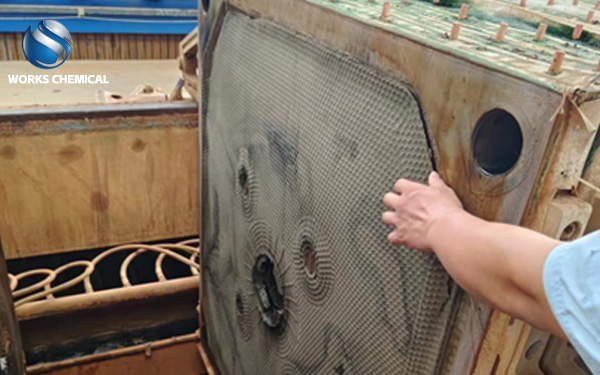
There are many reasons for the high water content of the mud pressed by the plate and frame filter press, and the following is a detailed analysis of these reasons:

One. Improper sludge conditioning
No sludge conditioner added:
Direct feeding without adding the sludge conditioner will make it difficult for the sludge to effectively release excess water, and then form a large flocculant, which is easy to block the pores of the filter cloth, making the water content of the filtered sludge high.
Inadequate mixing of sludge and sludge conditioner:
Uneven mixing will lead to insufficient contact between the sludge conditioner and the sludge, the improvement of the sludge surface structure is not obvious, and the filtration effect and dehydration efficiency will be affected, resulting in high water content.
Improper selection of sludge conditioner:
The properties and composition of different sludge are different, so it is necessary to choose a suitable sludge conditioner. If the conditioner is not properly selected, it will not be able to effectively destroy the hydrophilic groups on the surface of the sludge, and then affect the dehydration effect.
Two, sludge properties
Sludge surface contains a large number of hydrophilic groups:
The hydrophilic groups on the surface of the sludge will absorb a large amount of water, making the sludge difficult to dehydrate. If these hydrophilic groups are not destroyed by the sludge conditioner, the water content of the pressed filtered sludge will be higher.
Low solid content of sludge:
Low solid content of sludge before filtration means high moisture content. Since the filtration speed of the plate and frame filter press is constant, the low solid content will lead to the feed speed slowing down, affecting the mud pressing efficiency, and the water content of the pressed sludge will also be higher.
Three, operating process factors
Insufficient filter pressure:
Filter pressure is one of the important factors affecting the dehydration effect. If the filtration pressure is insufficient, the water in the sludge cannot be fully squeezed out, resulting in a high moisture content.
Clogging filter cloth:
The filter cloth may be blocked during long-term use, resulting in a poor filter channel. This will increase the filtration resistance, reduce the filtration speed, and also affect the dehydration effect, resulting in high water content.
Improper maintenance of equipment:
Improper maintenance of equipment such as filter cloth cleaning is not timely, filter plate sealing surface is not clean, etc., will also affect the dehydration effect. These factors can lead to poor filtration channels or poorly sealed, which in turn affects dehydration efficiency and moisture content.
Four. Other factors
Environmental factors: such as ambient temperature, humidity, etc., will also affect the dewatering effect of sludge. In the high temperature and high humidity environment, the evaporation rate of water in the sludge is slowed down, the dehydration efficiency is reduced, and the moisture content is correspondingly increased.
In summary, the reasons for the high water content of the mud pressed by the plate and frame filter press mainly include improper sludge conditioning, sludge property factors, operational process factors and other environmental factors. In order to reduce the water content, it is necessary to consider these factors comprehensively and take corresponding measures to optimize and improve.